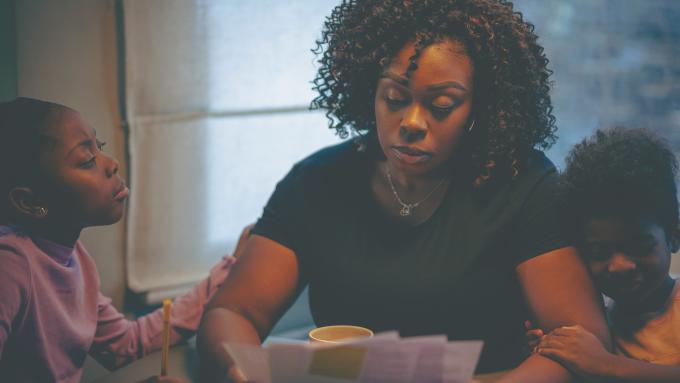Hear from Danielle, a mum of four, on how the two-child benefit limit affects her children. We want the Government to end this sibling penalty and benefit cap to lift 500,000 children out of poverty.
Danielle lives in Fulham, West London, with her children aged 12, five, three years old and seven months old. As she only receives Government support for the eldest two, it means she has less money to buy all her children the things they need.
“When I applied for a local support payment to buy a bed, I was asked, ‘Which child is this for?’ It felt like if the bed was for one of my first two children, they’d help me get it, but if not, what do they expect my child to do? Sleep on the floor? Yeah, I find it really unfair.”
While Danielle understands that the Government are trying to reduce costs, she feels that, "they're looking at me and my children as numbers, not as people.” The result is that every month is a struggle for the family as they need to try and replace outgrown clothes or fix things that break.
“It's the same all year round, every month. I feel like I have to choose which child I’m going to buy something for each month. Who's going to get forgotten about this month? Who takes priority?”
Ask your MP to end the two-child limit and benefit cap
I'm really hoping and praying that the policy gets scrapped. For me, that's an extra £500 a month. I could easily get them all everything they need with that. It would definitely make a big difference.
We’re taking action on child poverty
We’re helping struggling children and families who use our services by providing them with emergency support such as beds, access to food, and support with their mental wellbeing. We’re calling on the Government to make sure no child misses out on the basics and take bold action in the forthcoming child poverty strategy. One of the essential elements needed in the strategy is ending the two-child limit on benefits.
What is the two-child benefit limit?
Since April 2017, parents having a third or subsequent child do not qualify for additional support through child tax credit or universal credit. This limit means families who receive these benefits are denied up to £3,514 per year, per child, if they already have two children and have any more.
This effectively operates as a sibling penalty and is currently the single biggest policy driver of child poverty in the UK (Child Poverty Action Group, 2023).
Ali Cooper, Senior Policy Advisor on Child Poverty at Barnardo's says, “We know from our frontline work that this policy penalises children who happen to have more than one brother or sister, even though poverty is already highest in families with more than two children. Ending the sibling penalty and benefit cap is one of the most cost-effective ways of lifting children out of poverty and the government must address it in the child poverty strategy.”
children would be lifted out of poverty if the two-child limit and benefit cap were ended.
Ending the two-child benefit limit would lift 500,000 children out of poverty by 2029-30, reducing child poverty to 28%. Ending the two-child limit would cost £4.5bn by 2029-30.
Six essential components for the government's child poverty strategy
On current trajectories, 34% of children in the UK will be in poverty in 2029-30, up from 31% in 2023-24. Reducing child poverty within this Parliament must be the key focus of the forthcoming child poverty strategy. Here are the six key changes the government needs to include in the strategy:
- Measurement and accountability: A target to reduce child poverty to no more than 28% in this Parliament, alongside milestones to halve child poverty in 10 years and eradicate it in 20 years. The Strategy also needs a clear accountability framework with regular updates to Parliament.
- Safety net: Ending the two-child limit and benefit cap or equivalent measures, to create a safety net for all children.
- Tackling structural inequalities: Sub-targets and measures to support children more likely to be living in poverty, including Black and Asian children, migrant children, and families with no recourse to public funds.
- Hunger and poor nutrition: Implementing auto-enrolment of free school meals.
- Support in every community: Investing in early intervention and establishing a family centre in every community.
- Leadership and focus: A cross-ministerial group chaired by the Prime Minister to deliver the Child Poverty Strategy.
*Picture posed by models. Danielle's story was originally published in January 2024, but was updated in September 2025 to reflect recent policy updates.

Why families living in poverty need the Household Support Fund
Ali Cooper, Senior Policy Advisor on Child Poverty at Barnardo's, explains what the Household Support Fund is and why it needs to be extended to help children growing up in poverty.

No child should grow up in poverty
It’s not fair that more than one in four children in the UK live in poverty. Children deserve more than empty stomachs, sleepless nights, and cold homes.

What is bed poverty?
We published research that found parents in over 1 million families have given up their own beds so their child had somewhere to sleep. Learn about bed poverty and how the cost-of-living crisis is increasing the number of children in poverty across the UK.


